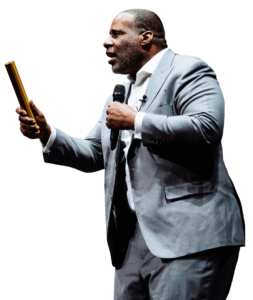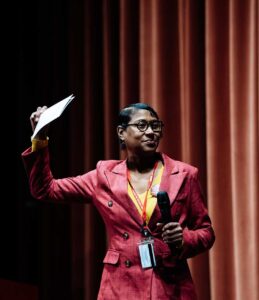“Pick up the baton and LEAD this community with courage”
— Shawn Harper
Racial Healing Circles Serve as the Foundational Work to Build Upon Diversity, Equity, Inclusion, and Belonging.
When Otterbein was selected by the American Association for Independent Colleges and Universities in 2020 as the first university in Ohio to host a Truth, Racial Healing and Transformation (TRHT) Campus Center, it challenged its community to begin the difficult work ahead.


Since then, the TRHT program has trained facilitators, hosted Racial Healing Circles and other programs, and completed an oral history project. Four student fellows, working with faculty mentors, recorded interviews with alumni of color about their Otterbein experiences. The Otterbein University Alumni of Color Oral History Project embodies the “Truth” component of TRHT in seeking to look honestly at the ways educational institutions have embodied racial hierarchy. The goal of the project was to assemble the fullest, most honest account of Otterbein’s history, because understanding its history is necessary in order to dismantle racial hierarchy and transform the culture of its campus and community.
Last summer, Otterbein’s co-founding partner in the Coalition for the Common Good, Antioch University, was named a TRHT Campus Center. With that addition, Otterbein’s TRHT team saw an opportunity to serve even more people through collaboration. On Jan. 16, 2024, the joint team held a day of coordinated conversations online, reaching 100 participants in Ohio and at Antioch’s campuses in Los Angeles, Santa Barbara, Seattle, and Keene, New Hampshire.
“We held an all-day TRHT event in honor of the seventh National Day of Racial Healing that incorporated a number of faculty, staff and students participating in Racial Healing Circles from both Otterbein and Antioch,” said Otterbein’s Chief Diversity Officer Frank Dobson Jr., Ph.D. “That was a great 2024 starting point for more TRHT-related programming in collaboration with Antioch.”
Racial Healing Circles are discussions that allow participants to work toward equity and inclusion. The Coalition held Racial Healing Circles from morning to evening, scheduled to accommodate everyone who wished to participate regardless of their location.
“This experience allows community members to listen for understanding. In addition, healing circles — a form of restorative practice — serve as a safe space where individuals can freely express their emotions, fostering connection, empathy, and understanding among participants,” said Dobson.
“Racial Healing Circles serve as the foundational work to build upon Diversity, Equity, Inclusion, and Belonging,” added Lemuel Watson, Ed.D., Antioch’s senior associate vice chancellor for academic affairs and vice provost for community engagement.


Selethia Benn, Ed.S., director of Otterbein’s Office of Social Justice and Activism, has worked extensively to plan programming around issues of TRHT, including Otterbein’s annual Martin Luther King Jr. Convocation.
This year’s convocation featured Shawn Harper, a former NFL offensive lineman and motivational speaker. Harper invites individuals to find their own purpose as they fulfill a calling to serve others.
“My encouragement for you today is to pick up the baton … and lead this community with courage,” Harper told the campus community, holding up a baton to emphasize the importance of his sentiment. “I will not go with the flow. I will fight injustices and be a superhero. The darker the night, the brighter the light.”
Harper’s passion for helping others is a reflection of King’s legacy.
The 2024 Pack Scholar-in-Residence, Brian Smedley, also has connections to upcoming TRHT programming. April is National Minority Health Month, which coincides with the visit of Smedley, an equity scholar and senior fellow at the Urban Institute in Washington, D.C. He has studied unconscious bias and stereotyping among healthcare providers in the U.S., which lead to lower quality of care for patients of color.
Otterbein is continuing to explore these and other issues of social injustice independently and collaboratively with Antioch University through Otterbein’s TRHT programs and initiatives, continuing the University’s rich history of confronting issues of equity dating back to its earliest days.
Watson said he is encouraged by Otterbein and Antioch University’s shared commitment to education for a more just society — including building and preserving democracy. “College campuses serve as the ideal setting for students to develop skills and connect with others from diverse backgrounds. Through active listening and understanding, students can create meaningful relationships and foster a sense of community that promotes healing and growth.”
